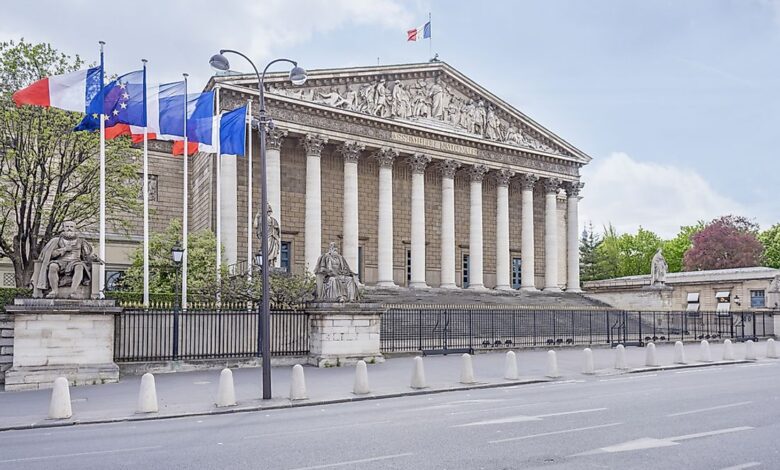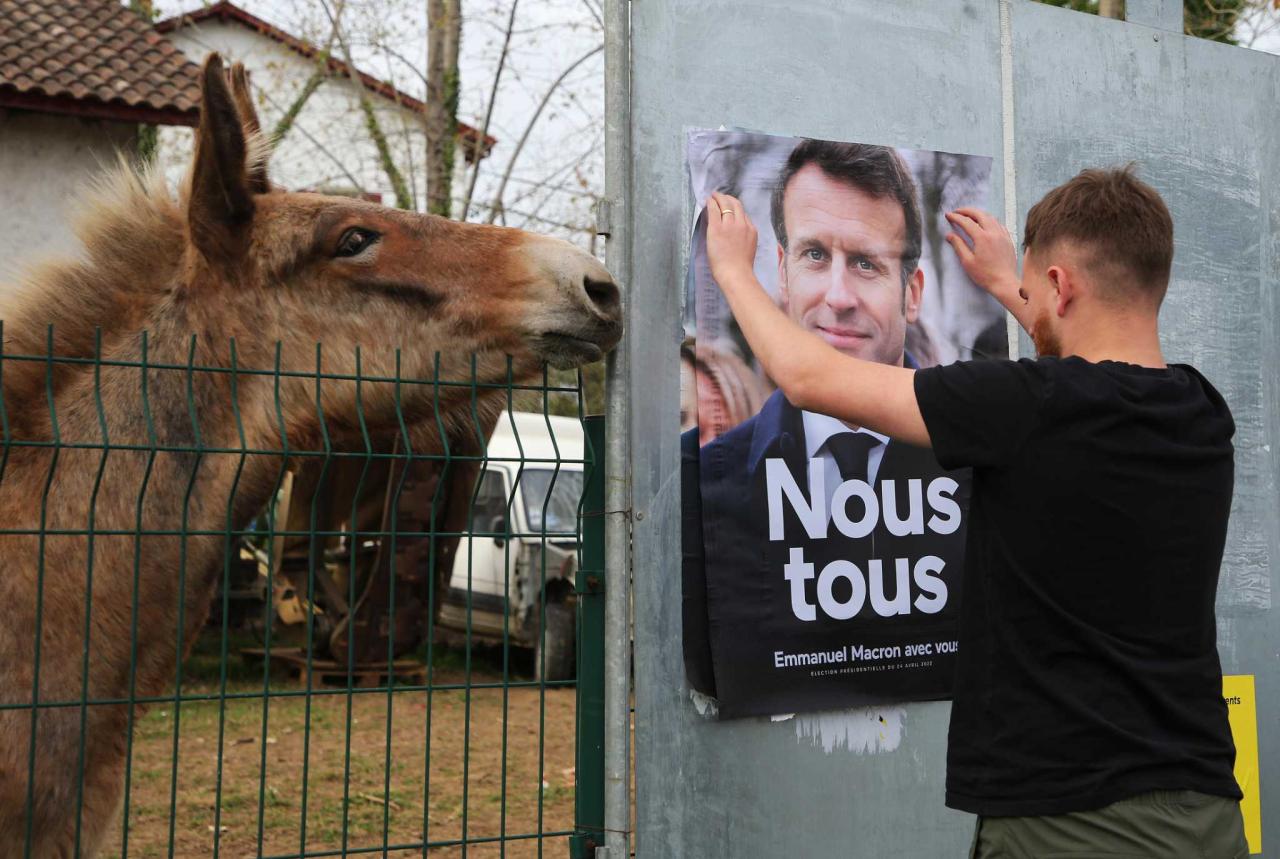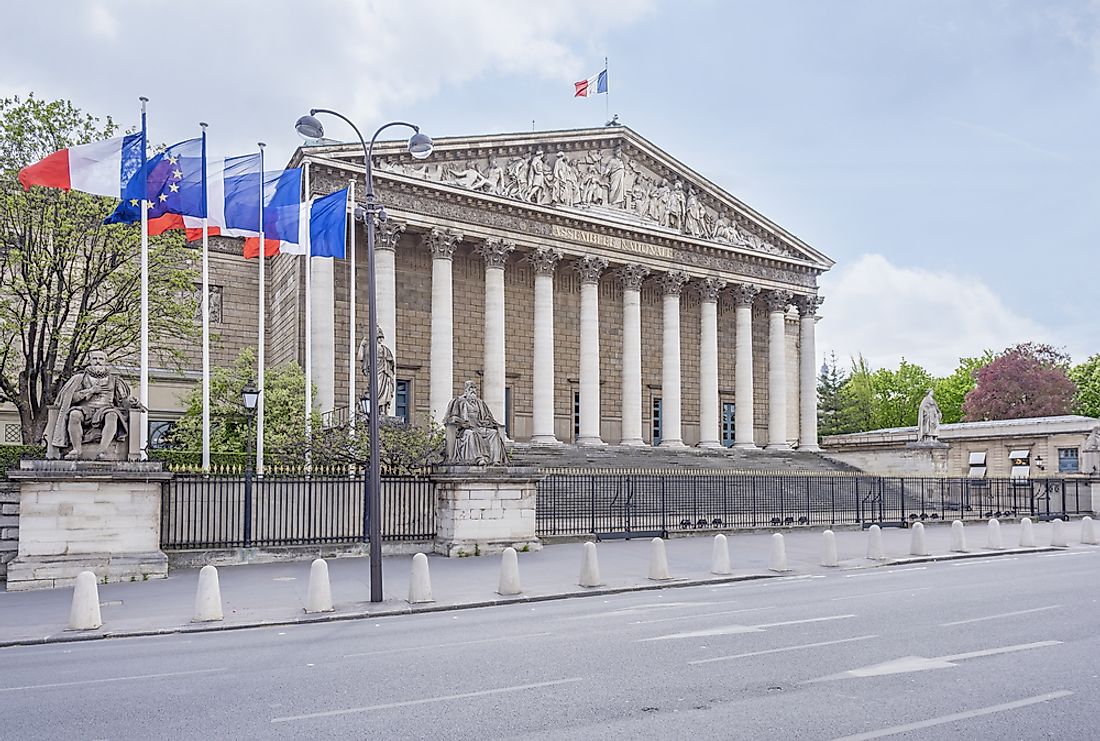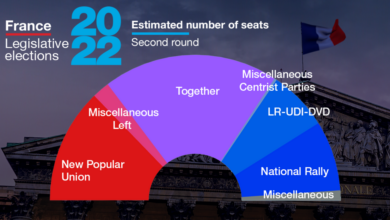
France Is Desperately Searching for a Government
France is desperately searching for a government, a statement that feels increasingly true as the nation grapples with unprecedented political instability. This isn’t just another political squabble; it’s a deep-seated crisis born from a complex interplay of economic woes, social unrest, and shifting international dynamics. We’ll delve into the historical context, examining past crises to understand the current turmoil and explore potential paths forward for this European powerhouse.
From the economic anxieties fueled by inflation and stagnant growth to the deep social divisions fracturing French society, the challenges facing the nation are multifaceted and deeply intertwined. The role of social media in amplifying public discontent, the impact of EU policies, and the lingering effects of past governmental failures all contribute to the current sense of unease. This exploration will dissect these elements, offering a nuanced perspective on the gravity of the situation and potential solutions.
Political Instability in France: France Is Desperately Searching For A Government
France’s history is punctuated by periods of significant political upheaval, a legacy that continues to shape its contemporary political landscape. The nation’s revolutionary past, coupled with deeply ingrained ideological divides and a complex societal structure, contributes to a persistent sense of instability, even during periods of relative calm. Understanding this historical context is crucial to interpreting the current political climate.
Historical Context of Governmental Instability
The French Fifth Republic, established in 1958, has provided a framework for relative stability compared to previous regimes. However, the country’s history is rife with examples of governmental fragility. The French Revolution (1789-1799) violently overthrew the monarchy, leading to a succession of unstable governments and ultimately Napoleon’s rise to power. The 19th century witnessed numerous republics, monarchies, and empires, each characterized by internal conflict and power struggles.
The tumultuous interwar period and the instability of the Fourth Republic (1946-1958) further solidified the perception of France as a nation prone to political turmoil. This historical volatility has ingrained a certain level of expectation of change and uncertainty within the French political system.
Current Socio-Political Climate
Currently, France grapples with several interconnected challenges that fuel perceptions of political instability. Deep divisions exist between the left and right wings, often exacerbated by strong regional identities and socio-economic inequalities. The rise of populist movements, both on the far-left and far-right, challenges the established political order and fragments the electorate. Furthermore, issues such as immigration, secularism (laïcité), and economic inequality contribute to a highly polarized and often volatile public discourse.
The recent wave of protests and social movements, while not always directly targeting the government, highlight the underlying tensions and dissatisfaction within French society.
Examples of Past Periods of Similar Political Uncertainty
The events of May 1968, a period of widespread student and worker protests that shook the De Gaulle government, serve as a powerful example of past political uncertainty. The protests, though ultimately unsuccessful in overthrowing the government, exposed deep societal fissures and highlighted the fragility of even seemingly stable political systems. Similarly, the numerous governmental crises during the Fourth Republic, marked by frequent changes in leadership and an inability to address pressing national issues, demonstrate the potential for instability within the French political framework.
France’s political landscape is a rollercoaster right now; they’re desperately searching for a stable government. It makes you think about global instability – check out this article on how tensions are rising in the South China Sea , a region equally fraught with power struggles and uncertainty. The parallels are striking; both situations highlight the fragility of international order and the urgent need for effective leadership.
These historical precedents provide a context for understanding the current concerns about political stability.
Comparison to Previous Governmental Crises
While the current situation doesn’t mirror the violent upheavals of the past, the level of political polarization and societal division bears some resemblance to previous crises. The fragmentation of the political landscape, the rise of populist movements, and the deep societal divisions echo the conditions that led to instability in previous eras. However, the current crisis is also unique, shaped by contemporary global challenges such as climate change, economic globalization, and the rise of social media, which influence the speed and intensity of political discourse.
France’s political landscape is a whirlwind right now, with the search for a stable government dominating headlines. It makes you wonder about the parallels with other nations facing similar challenges; the article on what Trump’s picks suggest about how his presidency will go highlights how early appointments can foreshadow a leader’s entire term. Considering the implications of those choices, the French situation feels even more precarious, as the right team is crucial for navigating their current instability.
The ability of the current government to address these challenges will be crucial in determining the extent of the current political instability.
Timeline of Significant Events
A timeline of significant events contributing to the present situation could include:
- 2005: Riots in the banlieues (suburbs) highlighting social and economic inequality.
- 2008: Global financial crisis exacerbates economic anxieties.
- 2015: Terrorist attacks in Paris heighten security concerns and societal divisions.
- 2018: The Yellow Vest protests highlight economic inequality and government disconnect.
- 2023: Ongoing protests and strikes related to pension reforms and cost of living crisis.
This timeline is not exhaustive, but it highlights key moments that have contributed to the current climate of political instability in France. The cumulative effect of these events has fostered a sense of uncertainty and contributed to the ongoing debates about the future direction of the country.
Economic Factors and their Influence
France’s political landscape is inextricably linked to its economic performance. Public opinion, and consequently governmental stability, are heavily influenced by the nation’s economic health. Periods of strong growth tend to correlate with higher approval ratings for the incumbent government, while economic downturns often fuel discontent and political instability.
Economic Performance and Public Opinion
The relationship between economic indicators and government approval is demonstrably strong in France. For instance, a rise in unemployment, even a slight one, can trigger a significant drop in public trust. Conversely, periods of robust job creation and economic expansion generally translate into increased support for the ruling party. This dynamic is often amplified by media coverage, which tends to highlight economic news heavily, shaping public perception and influencing voting intentions.
While there isn’t a simple, direct correlation (other factors like social issues and foreign policy also play crucial roles), economic data consistently acts as a significant predictor of government popularity.
France’s political landscape is a rollercoaster right now, with the search for a stable government dominating headlines. It’s a stark contrast to the seemingly stable, yet ultimately risky, situation in China; you should seriously consider reading this article on why investors should still avoid Chinese stocks: why investors should still avoid chinese stocks. The uncertainty in both nations highlights the importance of careful global investment strategies, especially as France grapples with its own leadership crisis.
Effects of Specific Economic Policies on Public Trust
The implementation of specific economic policies directly impacts public trust. For example, austerity measures, often implemented during economic crises, can severely damage public approval even if they are deemed necessary by economists. Conversely, policies aimed at boosting social welfare, such as increased unemployment benefits or investments in public services, tend to enjoy greater public support, even if they come with a higher fiscal cost.
The perceived fairness and effectiveness of these policies are critical factors determining their influence on public trust. A policy perceived as benefiting only the wealthy is likely to be met with resistance and disapproval, regardless of its economic impact.
Key Economic Challenges Facing France, France is desperately searching for a government
France currently faces several significant economic challenges. High public debt remains a persistent concern, limiting the government’s ability to invest in crucial areas such as infrastructure and education. The competitiveness of French businesses in the global market is another major issue, with concerns about productivity and innovation. Furthermore, addressing inequality and ensuring social mobility are ongoing priorities.
The transition to a greener economy, while vital for long-term sustainability, also presents immediate economic challenges requiring significant investment and adaptation.
Economic Performance Under Recent Governments
| Government | GDP Growth (Annual Average) | Unemployment Rate (Average) | Public Debt (% of GDP) |
|---|---|---|---|
| Hollande (2012-2017) | 0.9% | 10.2% | 98% |
| Macron (2017-Present) | 1.3% | 7.4% | 113% |
(Note
These figures are simplified averages for illustrative purposes and may vary slightly depending on the source and methodology used. More detailed data can be found in reports from organizations like the OECD and the INSEE.)*
Social and Cultural Dynamics

France’s current political instability isn’t solely an economic or political phenomenon; it’s deeply rooted in complex social and cultural fault lines. Years of economic stagnation, coupled with feelings of social exclusion and cultural anxieties, have fueled a climate of discontent that readily translates into political unrest. Understanding these dynamics is crucial to comprehending the nation’s current struggles.
Prevalent Social and Cultural Issues Contributing to Political Unrest
Several key social and cultural issues are exacerbating political tensions in France. A significant one is the persistent feeling of inequality, particularly between urban and rural areas, and between different socioeconomic groups. This disparity manifests in unequal access to education, healthcare, and employment opportunities, fueling resentment and distrust towards the established political order. Furthermore, concerns about immigration and national identity continue to resonate strongly, often exploited by populist and extremist groups to further divide the population.
The secular nature of the French Republic also remains a source of tension, particularly regarding the visibility of religious symbols and practices in public life. These interwoven issues contribute to a climate of polarization and distrust, making it difficult for any government to maintain broad-based support.
The Role of Social Media in Shaping Public Perception of the Government
Social media plays a powerful, and often distorting, role in shaping public opinion about the French government. The rapid spread of information, often unverified, allows for the amplification of both legitimate criticisms and misinformation, creating an echo chamber effect that can intensify existing divisions. Social media platforms have become a primary battleground for political discourse, with both government and opposition groups vying for influence.
This can lead to a heightened sense of political polarization, with online interactions often characterized by hostility and a lack of constructive dialogue. The prevalence of “fake news” and targeted disinformation campaigns further complicates the picture, making it challenging for citizens to discern credible information from propaganda.
Differing Demographic Group Views on Government Performance
Public opinion on the government’s performance varies significantly across different demographic groups. Younger generations, for example, often express greater dissatisfaction with the current political system, feeling that their concerns are not adequately addressed. This is partly due to factors like unemployment, housing costs, and climate change. Conversely, older generations may hold more traditional views and exhibit greater loyalty to established political parties.
Similarly, regional disparities in economic performance and social infrastructure contribute to divergent perspectives. Rural communities, often facing economic hardship and a lack of public services, tend to express stronger anti-establishment sentiments compared to their urban counterparts. These diverse perspectives create a fragmented political landscape, making it difficult for any government to achieve broad consensus.
Significant Social Movements Impacting the Political Landscape
Several significant social movements have profoundly impacted the French political landscape in recent years. The “Gilets Jaunes” (Yellow Vest) movement, for instance, arose from widespread anger over economic inequality and fuel taxes, highlighting the deep-seated frustrations of many French citizens. While initially focused on economic grievances, the movement broadened to encompass broader concerns about social justice and political representation.
Other movements, focused on climate change activism and issues of racial justice, have also played significant roles in shaping the political agenda and pushing for policy reforms. These movements, often fueled by social media and characterized by grassroots mobilization, demonstrate the growing power of civil society in challenging the status quo.
Visual Representation of the Interplay Between Social Issues and Political Instability
Imagine a complex web. At the center is a depiction of the French government, represented as a somewhat unstable structure. Radiating outwards from the center are thick strands representing key social issues: economic inequality (represented by a stark contrast in wealth), immigration debates (shown as a flow of people), secularism vs. religious expression (depicted as clashing symbols), and generational divides (represented by age groups pulling in different directions).
Each strand is connected to nodes representing social movements (like the Gilets Jaunes) and social media (represented by a rapidly spreading network). The thicker and more interconnected the strands, the greater the instability of the central government structure. The image emphasizes the interconnectedness of these factors and how their combined effect creates a volatile political environment.
International Relations and Global Impacts

France’s political instability is inextricably linked to the global landscape. International events, both positive and negative, significantly impact the domestic political climate, influencing public opinion, shaping government priorities, and even triggering internal crises. Understanding this interplay is crucial to grasping the current situation in France.The influence of international events on France’s domestic political climate is multifaceted. For example, major global economic downturns can exacerbate existing social and economic tensions within France, leading to increased political unrest and a shift in public support towards different political parties.
Similarly, international conflicts, particularly those involving European nations or France’s historical allies, can create a sense of national insecurity and potentially lead to increased support for stronger nationalistic or protectionist policies. Conversely, successful international collaborations on issues like climate change or global health can boost a government’s popularity and enhance its legitimacy.
France’s Current and Past International Standing
France’s current international standing is a complex issue. While it retains a permanent seat on the UN Security Council and plays a significant role in European Union affairs, its influence has arguably diminished somewhat compared to previous periods. Historically, France has been a major player in global affairs, wielding considerable diplomatic and military power. The post-World War II era saw France as a key architect of the European project and a prominent actor in numerous international organizations.
However, recent events, such as the rise of new global powers and the challenges posed by globalization, have presented France with new complexities in its foreign policy objectives. Comparing the current government’s approach to international relations with those of previous administrations reveals differences in priorities and strategies, particularly regarding the EU, NATO, and relationships with countries such as the United States, Russia, and China.
The Macron administration, for example, has emphasized strategic autonomy for Europe, while previous governments may have prioritized closer alignment with the United States.
Impact of European Union Policies on French Political Stability
EU policies significantly influence French political stability. Regulations emanating from Brussels on issues such as agriculture, trade, and immigration directly affect French citizens and businesses. These policies can generate both support and opposition within France, leading to political debate and potentially influencing electoral outcomes. For example, the implementation of EU-wide austerity measures following the 2008 financial crisis sparked significant social unrest and contributed to the rise of populist and anti-EU sentiment.
Conversely, successful EU-led initiatives on areas like environmental protection or economic development can bolster support for European integration and enhance the legitimacy of the French government’s participation in the EU. The ongoing debate regarding the balance between national sovereignty and EU-level decision-making continues to be a major source of political contention within France.
Potential External Threats to French Political Stability
Several external factors pose potential threats to French political stability. These include: major global economic crises that could trigger social unrest; international terrorist attacks that could heighten security concerns and lead to restrictions on civil liberties; significant geopolitical shifts in Europe or the Middle East that could destabilize the region and impact France’s security interests; and cyberattacks targeting critical infrastructure or government systems, potentially disrupting essential services and undermining public trust.
The spread of disinformation campaigns targeting French society from foreign actors also represents a substantial and growing concern. These examples illustrate the interconnected nature of domestic and international factors impacting France’s political stability.
Key International Factors Influencing the Situation
- The ongoing war in Ukraine and its impact on energy prices and global economic stability.
- The rise of China as a global power and its implications for international trade and geopolitical competition.
- The increasing influence of non-state actors, such as multinational corporations and terrorist organizations, on global events.
- The challenges posed by climate change and the need for international cooperation to address this issue.
- The ongoing debate regarding the future of the European Union and the potential for further integration or fragmentation.
Potential Solutions and Future Scenarios
France’s current political instability demands a multifaceted approach encompassing policy reforms, improved public trust, and a proactive stance towards potential long-term consequences. Addressing these challenges requires a deep understanding of the root causes and a willingness to implement bold, yet pragmatic, solutions. The following sections explore potential avenues for navigating France’s turbulent political waters.
Policy Changes to Address Political Instability
Significant policy changes are needed to address the current instability. One key area is electoral reform. Consideration should be given to alternative voting systems, such as proportional representation, which could better reflect the diversity of French political opinion and potentially reduce the dominance of a few major parties. Furthermore, campaign finance regulations need strengthening to curb the influence of special interests and promote transparency.
This could involve stricter limits on donations and increased scrutiny of campaign spending. Finally, constitutional reforms aimed at strengthening the role of the Prime Minister and enhancing the efficiency of government could also be explored, drawing lessons from parliamentary systems in other European countries.
Strategies for Improving Public Trust in Government
Rebuilding public trust requires a concerted effort to improve government transparency and accountability. This could involve increased access to government information, independent audits of government agencies, and stronger mechanisms for holding officials accountable for misconduct. Furthermore, a renewed emphasis on citizen engagement and participatory democracy, perhaps through online platforms and more accessible town hall meetings, could foster a sense of ownership and responsibility in the political process.
Promoting ethical leadership and emphasizing the importance of public service could also contribute to restoring public confidence. Examples from other countries, such as the use of open data initiatives in Estonia, could provide valuable insights.
Successful Governmental Reforms from Other Countries
Germany’s experience with coalition governments offers a potential model for France. The necessity of building consensus across multiple parties can foster greater political stability and encourage more inclusive policymaking. New Zealand’s efforts to incorporate indigenous perspectives into governance could provide valuable insights for addressing social divisions within France. Their focus on inclusive policies, including recognition of Maori rights and culture, has fostered a more unified society.
Similarly, Canada’s experience with managing a multicultural society could offer lessons for France in navigating its own diverse population.
Potential Long-Term Consequences of the Current Situation
Continued political instability could lead to economic stagnation and social unrest. Investor confidence may decline, hindering economic growth and potentially leading to job losses. Social polarization could intensify, further eroding social cohesion and potentially resulting in increased crime and civil unrest. On the international stage, France’s influence and standing could diminish, impacting its role in European affairs and global diplomacy.
The long-term consequences could mirror those seen in other countries that have experienced prolonged periods of political instability, such as Argentina or Venezuela, with potentially significant economic and social costs.
Possible Future Scenarios for France’s Political Landscape
Several scenarios are possible for France’s political future. One scenario involves the emergence of a strong, centrist government capable of forging broad coalitions and addressing the concerns of diverse segments of the population. This scenario would likely lead to greater political stability and economic growth. A second scenario involves the continued fragmentation of the political landscape, with the rise of populist and extremist parties.
This scenario could lead to further instability and social division. A third scenario involves a gradual shift towards a more decentralized system of governance, with increased power devolved to regional and local authorities. This scenario could potentially improve responsiveness to local needs but could also complicate national policymaking. Each scenario carries its own implications for France’s future.
The search for a stable government in France is far from over. The nation faces a critical juncture, where the choices made today will shape its future for years to come. Addressing the root causes of the instability—from economic reform and social reconciliation to a renewed commitment to international cooperation—is paramount. The path ahead is uncertain, but understanding the complexities of this crisis is the first step towards navigating France towards a more secure and prosperous future.
The stakes are high, not just for France, but for the stability of Europe as a whole.




